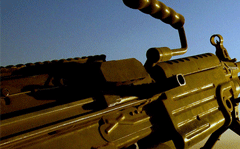About This Journal
In the first volume of The Journal of Military Experience Guy Lubin wrote: “One of my friends was killed by an Iraqi sniper on a Sunday morning while patrolling a village for security.” As literature, Guy’s words overflow with meaning: An Iraqi sniper evading detection, standing as the embodiment of the ambush warfare prevalent in the wars of my generation; the innocence of a young man is forever lost to images horrible and foreign to those who sat in churches all across America on that same Sunday morning. Guy’s patrol reinforced—in the mind of the Marine who later wrote about it—any number of things other than security. Fellow veterans might find the sentence reminiscent of shared service: ambushes, loss of innocence, and the constant need for safety and security in the post-war world; these things are, after all, the topics of everyday life for combat veterans.
Guy’s story was the first we received when compiling the first JME.
In April 2011, we released the first JME. A little more than a year later we released JME 2.
The second volume of The Journal of Military Experience brought together the works of 53 artists, authors, poets, and scholars interested in teaching the world about the nature and consequence of military service, facilitating a dialogue that can bridge the gap between civilians and those who serve. Continuing the work that began with student veterans at Eastern Kentucky University in 2011, JME 2 expanded its outreach to include veterans from throughout the United States and researchers from throughout the world. Editors worked one-on-one with veterans from conflicts spanning the last half of a century to produce a fine collection of prose, poetry, and artwork. The scholarship deals with issues related to veterans in higher education, literary analyses, and the role of arts education among deployed troops. While expanding in range and scope, the JME remains focused upon being the blank page or canvas that veterans can turn to for help when they want to express themselves on their own terms.
Proceeds go entirely toward printing subsequent volumes. Funding for the inaugural issue came from the Student Government Association and the College of Justice and Safety at EKU. We were further supplemented by a literacy grant from the Honor Society of Phi Kappa Phi and the Kentucky Department of Veterans Affairs after the completion of the second volume.
If you would like to contribute financially to our work and help us in our mission, please contact the JME Managing Editor, Travis Martin, for more details.

